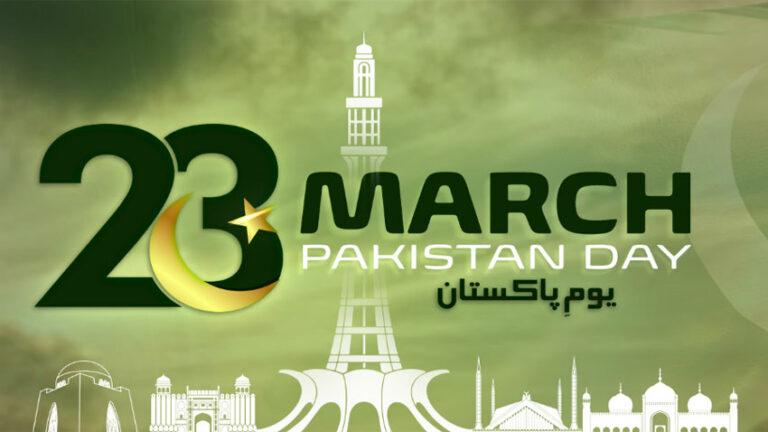Pakistan Day was observed with traditional zeal and national spirit on the 23rd of March across the country. The day dawned with a 31-gun salute at the Federal Capital and a 21-gun salute at all provincial capitals. Special prayers were offered after Fajr prayer in mosques for the progress, prosperity, and security of the country and the freedom of India’s illegally Occupied Jammu and Kashmir (IIOJK). The central event of the Pakistan Day ceremonies was the traditional Tri-Services Parade at Shaker Perian Parade Ground Islamabad which was a landmark demonstration of Pakistan’s defense preparedness, the valor and professionalism of our defense forces, and a symbol of national unity and prestige. Graceful change of guards ceremonies were held at the Quaid-e-Azam Muhammad Ali Jinnah mausoleum and Mizar-e-Iqbal. Fateha Khawani and Quran Khawani were also held for the leaders and workers of the Pakistan Freedom movement and for the heroes who laid their lives for the protection and wellbeing of the country afterward. In the afternoon, awards distribution ceremonies were held at the Presidency and all Governors Houses wherein prizes and awards were distributed to those who rendered valuable services to the nation in diverse fields.
The idea of an independent and sovereign Muslim state was the long-held and foremost dream of the Muslims of the Indo-Subcontinent since they lost hope for a Muslim-ruled Hindustan during the Freedom War of 1857 against British colonial power. The Muslims who ruled the Indo-subcontinent for nearly 800 years, faced endless disparity, inequality, and discrimination at the hands of the British and Hindus in that era of darkness and oppression. The Britians pushed the Muslims of the Indo-Subcontinent to the wall as they considered them arch-rivals whereas the Hindus were also staunched enemies of Muslims amid allegations of ruling their land for several hundred years since the arrival of Mughals in India.
In British India, the Muslims were deprived of all kinds of political, economic, and human rights, and their educational and intellectual decay further pushed them into deep depletion in each field of life. Amid such darkness and oppression, renowned Scholar, educationist, and political thinker Sir Syed Ahmed Khan and other Muslim leaders such as Moulana Muhammad Ali Johar, Moulana Shoukat Ali, and Nawab Waqar-ul-Mulk etc. instilled new hope in the Muslims of Indo subcontinent by founding All India Muhammadan Educational Conference (AIMEC) to teach them modern subjects to compete with Hindus and other communities in British-ruled India. Later, the foundation of the All India Muslim League (AIML) gave new impetus to the political struggle of the Muslims in the Indo-subcontinent. Historically, the two-nation theory and the passage of the Pakistan Resolution during the annual session of the All India Muslim League on 23rd March 1940 were pivotal moments that changed the history of the Indo-Subcontinent and led to the creation of an independent, and sovereign state of Pakistan. Which is home to over 240 million Muslims, where they live a dignified life and practice the teaching of Islam.
Today’s Pakistan is an embodiment of the vision and dreams of our forefathers, who not only struggled hard and sacrificed time, money, and lives to change that dream into a reality. Pakistan is a magnificent legacy of our forefathers that we all have to preserve, protect, and further hand over to our future generations in a more developed, stable, and strong version. Today’s internal political division and social polarization seriously hurt the philosophy of the nation theory and the vision of a sovereign Pakistan. Pakistan Day demands a judicial self-assessment and accountability from all of us including the political leadership, civil and military bureaucracy, and common citizens as well. How much this nation gave to us and what we individually, as a team or institution paid back to our country. Our professional, social, and moral obligations are fulfilled, or any one of us is involved in the abuse of authority, menace of corruption, and theft of national resources including electricity, gas, tax evasion, or other social or moral ailments that surely mount to sedition to the nation. A true Pakistani must assess his role in society, and try to implement essential traits of a good and loyal citizen of the country. So, Pakistan emerges as a successful and strong nation on the map of the world.







